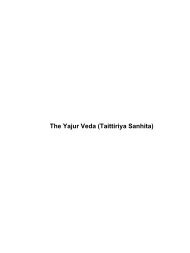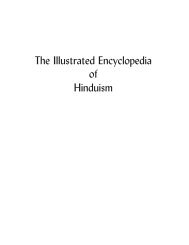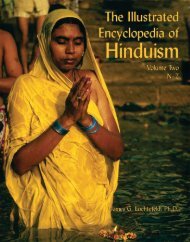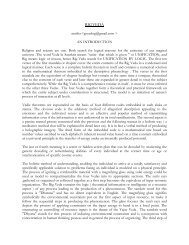A Concise Encyclopedia of Hinduism Klaus K Klostermaie
You also want an ePaper? Increase the reach of your titles
YUMPU automatically turns print PDFs into web optimized ePapers that Google loves.
83 hymns<br />
birth <strong>of</strong> a child, entering the precise<br />
astronomical coordinates. All important<br />
events in the life <strong>of</strong> a person are decided<br />
upon after consultation <strong>of</strong> the horoscope.<br />
(See also ASTROLOGY.)<br />
hospitality<br />
Offering a meal or shelter for the night<br />
to a stranger who asked for it was one<br />
<strong>of</strong> the traditional duties <strong>of</strong> a Hindu. If a<br />
person was refused hospitality he could<br />
‘unload’ his sins on the unwilling host.<br />
Hospitality was especially important<br />
towards brahmins and SAMNYÄSIS. On<br />
the other hand, hospitality was not to<br />
be abused, and strict limits were set.<br />
Hindu literature is full <strong>of</strong> stories about<br />
hospitality refused and punishments following,<br />
as well as about poor people<br />
sacrificing their last possessions for a<br />
guest, who turns out to be God in the<br />
guise <strong>of</strong> a poor man (daridra Näräyaæa)<br />
who amply rewards his hosts. (See also<br />
ATITHI.)<br />
hotø<br />
A Vedic priest whose task it was to<br />
recite the hymns <strong>of</strong> the Øgveda.<br />
Hoyÿalas<br />
Dynasty <strong>of</strong> rulers in Karæätaka<br />
(1006–1346), great warriors and<br />
administrators as well as defenders <strong>of</strong><br />
the Hindu faith and builders <strong>of</strong> temples<br />
distinguished by a unique style, a kind<br />
<strong>of</strong> Indian roccoco (Belur, Halebid,<br />
Somnathpur).<br />
Hø•ikeÿa<br />
(1) (‘lord <strong>of</strong> the senses’)<br />
An epithet <strong>of</strong> Vi•æu or Kø•æa.<br />
Hø•ikeÿa<br />
(2), also Rishikesh<br />
Mountain and place <strong>of</strong> pilgrimage 30 km<br />
north <strong>of</strong> HARDWAR.<br />
human sacrifice<br />
See SACRIFICE.<br />
humility (dainya)<br />
One <strong>of</strong> the virtues to be cultivated by a<br />
VAIÆŒAVA who, according to an old<br />
verse, is supposed to be ‘more humble<br />
than a blade <strong>of</strong> grass’. It is further specified<br />
as the effort to put oneself down in<br />
comparison to others, not to mention<br />
one’s own merits, to serve one’s spiritual<br />
master and all other devotees.<br />
hymns<br />
The Øgveda is a collection <strong>of</strong> hymns<br />
(süktas) that are essential components<br />
(MANTRA (1)) <strong>of</strong> Vedic rituals; they are<br />
still used and recited by brahmin priests.<br />
Besides these, another genre <strong>of</strong> hymns,<br />
called stotras (praise), has become very<br />
important in connection with the worship<br />
<strong>of</strong> deities such as Vi•æu, Ÿiva and<br />
Devï as well as Gaæeÿa, Hanuman and<br />
other lesser devas, and humans deemed<br />
to be manifestations <strong>of</strong> a deity. Epics<br />
and Puräæas contain many such hymns,<br />
and great äcäryas (masters) such as<br />
ŸAŒKARA (2), RÄMÄNUJA and MADHVA<br />
(2) composed hymns that are used in<br />
worship. Most <strong>of</strong> the works <strong>of</strong> the poetsaints<br />
<strong>of</strong> the Indian Middle Ages are<br />
hymns in vernaculars (Tamil Prabhanda,<br />
Hindï bhajans, Mahratti abhaögas).<br />
Much <strong>of</strong> popular Hindu religious practice<br />
consists <strong>of</strong> singing such hymns.<br />
There are many popular collections,<br />
such as the Stotramälä and Stotraratnävalï,<br />
which contain hymns to many<br />
different deities.


















